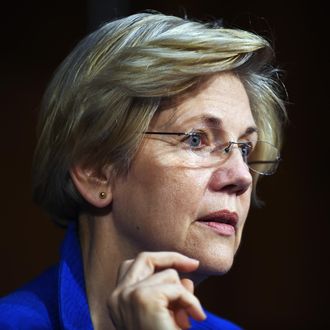
Elizabeth Warren had a presidential campaign without ever asking for one. Progressives’ affection for the freshman Massachusetts senator was already so strong in 2015, multiple grassroots organizations sprouted up to cajole her into the Democratic primary. Warren demurred, and that activist energy was transferred to a certain elderly Vermonter. But now that Hillary Clinton has secured the nomination, large swaths of the Democratic base are once again trying to get Warren a job she may not even want.
According to a new report from Reuters, Warren is intrigued by the possibility of joining Clinton’s ticket but has two qualms about doing so: First, she’s concerned that an all-female ticket could increase Trump’s chances of winning in November. Second, she worries that she’d have less power to advance her populist agenda as vice-president than she currently wields in the Senate.
These are reasonable doubts. As Vanity Fair’s T.A. Frank has noted, some social-science research suggests picking a female vice-president could increase Clinton’s vulnerability to sexist attacks:
When it comes to triggering sexism, research indicates, “two” seems to be a potent number, more so than “one” and more so than “three.” A 2008 study conducted by organizational scholars Denise Lewin Loyd, Judith B. White, and Mary Kern found that being part of a “minority duo” makes those around you far more likely to revert to stereotypical thinking about you. For example, if you’re the sole woman on a board and express a set of views, your colleagues are likely to consider your arguments without much bias. On the other hand, the study shows, if you’re one of two women on a board and both of you are in agreement, then your colleagues are much likelier to attribute those beliefs to the coincidence of your shared sex.
That said, a general election between the first female major-party nominee and one of the most overtly misogynistic men in American public life will make Clinton’s gender salient for voters regardless of whom she picks to fill out her ticket. So it’s possible that Warren’s popularity among Sanders’s Clinton-skeptical youth voters — and her newly discovered talent for emasculating Trump, 140 characters at a time — could compensate for whatever liability her gender brings.
Warren’s second worry is harder to dismiss. Except in the rare cases of a resignation, death, or election of George W. Bush, the vice-presidency is a largely symbolic position, one that would offer Warren far fewer opportunities to cross-examine financial executives on C-SPAN.
More significantly, Warren would almost certainly have less freedom to openly contest White House policy. During the Obama years, Warren has galvanized opposition to the Trans-Pacific Partnership, the appointment of Larry Summers to the Federal Reserve, and Obama’s proposal to
While Clinton currently claims to oppose the TPP, she championed the trade agreement while secretary of State. And Warren’s decision to stay on the sidelines of the Democratic primary was likely informed by her ideological affinity for Bernie Sanders’s platform. Thus, it seems likely that Warren would find herself to the left of a Clinton administration about as frequently as she found herself to the left of Obama’s. Unless Clinton is willing to give her second-in-command veto power over her economic agenda, a Warren pick might muzzle one of progressive Democrats’ most powerful voices.






























